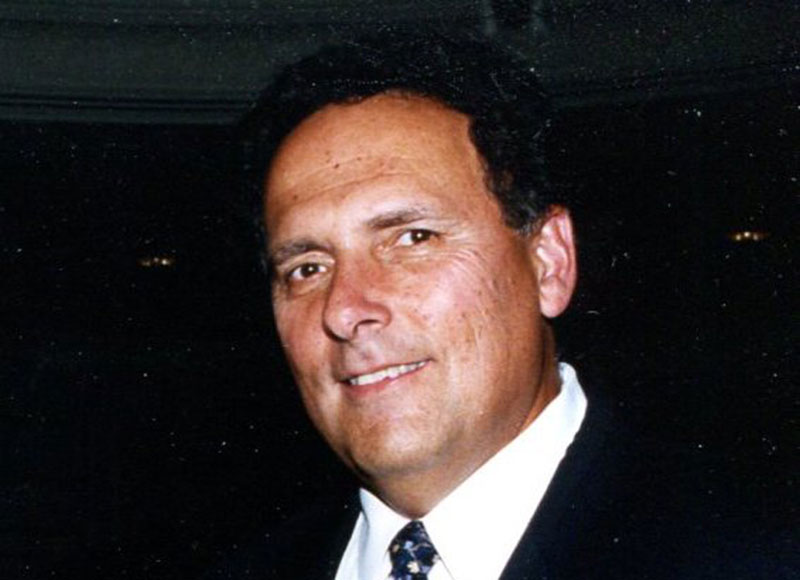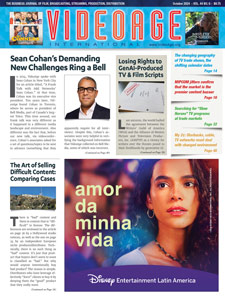In his business life, Bertram (later legally changed to Bert) Howard Cohen was an involuntary witness to several defining television industry moments, in the sense that he was in the midst of every important development during the ’60s, ’70s, ’80s, and ’90s.
From U.S. TV network spin-offs to the imposition and subsequent elimination of Fin Syn (the former fomented and the latter destroyed the U.S. syndication business), Cohen endured, and his company even created a successful U.S. syndicated show. He was at the heart of the U.S. TV industry’s greatest corporate takeovers, had a hand in reshaping the TV business in the U.K., and opened up a U.S. TV business in Russia after the fall of the USSR.
During an interview from his Boca Raton, Florida residence via video conference (while he recovered from COVID during the Omicron spike), Cohen also mentioned his close connections with industry leaders who shaped U.S. television, including Carl H. Lindner, Aaron Spelling, Wayne Huizenga, David Lynch, and the Hanna-Barbera principals. He also interacted with leaders who influenced U.S. society, like Muhammad Ali, and heads of state, like Prince Albert of Monaco.
Cohen’s career started at ABC-Paramount and ended with Paramount. He joined ABC Films in his native New York City in 1968 at 26 years old, and concluded his executive career in late 1999 when Worldvision’s owner, Spelling Entertainment, was acquired by Viacom, the parent company of Paramount. In the intervening 31 years, Cohen worked for seven different entities that owned Worldvision Enterprises (and survived nine management changes), which he joined in 1973 as VP of Operations and International Sales.
Worldvision was created in 1954 by ABC-Paramount to link TV stations around the world in which ABC International (a division ABC created for this express purpose) held a minority interest in. The stations were located in six Latin American countries, plus the Philippines, Australia, Canada, Japan, and Lebanon.
In 1951, ABC TV Network was acquired by a one-year-old Paramount Theatres, which was a forced spin-off (by the U.S. Department of Justice) of Paramount Pictures. Similarly, ABC was a forced 1943 spin-off of NBC’s second radio network, the Blue Network. ABC became a full-fledged TV network in 1948.
In 1973, Kevin O’Sullivan (1928-2006), then president of ABC Films and ABC International, reportedly spent $10 million to acquire — together with four other ABC Films executives (Jerry Smith, Neal Delman, Colin Campbell, and Howard Lloyd) — the assets of ABC Films (the group was one of 23 companies bidding for the ABC Films assets). They were given the Worldvision name as a gift from ABC, created Worldvision Enterprises, and O’ Sullivan became the first president of the new international distribution company.
This development was prompted by a 1971 FCC rule (called Fin Syn, which was eliminated in 1993) that barred U.S. TV networks from the U.S. syndication business, but allowed them to still be in the international content distribution business, as well as the domestic home video industry. It was for this purpose that ABC created ABC Video Enterprises, CBS formed CBS Broadcast International, and NBC started NBC International, all in 1979.
But even before the Fin Syn rule, ABC’s International division was in disarray after it was shaken by an undisclosed scandal that in 1970 caused a change of management at ABC International, with Don W. Coyle (who had started the division in 1958) exiting in favor of O’Sullivan, who was eventually succeeded by Dick O’Leary.
In 1974, Worldvision acquired the distribution rights to Little House on the Prairie from NBC, which because of Fin Syn could not distribute the series in U.S. syndication. However, the large guarantee that Worldvision had to pay up front placed the company in financial difficulties, which resulted in the sale of the company to Taft Broadcasting in 1978. That move caused Worldvision to lose its independence and be placed in play for several corporate “flips.” Indeed, in 1987, investor Carl H. Lindner, Jr. (1919- 2011) became Taft’s majority stockholder following a hostile takeover, and renamed the company Great American Communications (GAC).
However, according to Cohen, O’Sullivan sold Worldvision to Taft only because “they made a big offer.” Cohen added that he didn’t know what the offer was exactly.
Similarly, John D. Ryan, who later became Worldvision’s president, didn’t know the amount, but he said that Little House did very well internationally and couldn’t put the company in financial stress.
To some former Worldvision employees, both Cohen and Ryan were kept in the dark about all corporate decisions, which were exclusively in the hands of O’Sullivan and partner Neal Delman. An interesting twist is that O’Sullivan couldn’t tolerate Taft’s executives and instructed his people to hang up the phone every time someone from Taft called them.
In 1988, O’Sullivan retired from Worldvision, and 41-year-old ABC Films alum Ryan became president (focusing on domestic syndication). Cohen was appointed COO, continuing to be responsible for international sales.
In 1989, Lindner sold Worldvision to producer Aaron Spelling (1923-2006) for 48.5 percent of his Spelling Entertainment, which was headed by Jules Haimovitz, a former Viacom executive. Two years later, Spelling Entertainment was acquired by the Charter Company (an oil corporation that Lindner acquired out of bankruptcy). The operation was structured with Charter acquiring 31.67 percent of Spelling, which added to GAC’s 48 percent. Charter completed the acquisition of Spelling in 1992 in exchange for stock valued at $44 million and renamed itself Spelling Entertainment.
In 1993, Blockbuster acquired 53.4 percent of Spelling Entertainment by issuing $141.5 million worth of its shares to Lindner, who became Blockbuster’s third-largest shareholder. A year later, Spelling acquired Republic Pictures’ library for $104 million, folded Worldvision’s home video division into Republic, and named Worldvision executive Bob Sigman as Republic Pictures’ president and CEO, a position he held until 2001.
In 1994, Viacom acquired Blockbuster for $8.4 billion, which, in the meantime, had increased its stake of Spelling to 67 percent.
A year later, when Viacom’s interest in Spelling had increased to 77 percent (after a failed attempt to sell it), Worldvision remained in the Viacom fold. It would be there until 1999, when it acquired the shares of Spelling that it didn’t already own (the 23 percent that was publicly held) for $161.7 million, and folded Worldvision into Paramount Pictures, the studio that Viacom had acquired in 1994.
Like Worldvision was born out of a rib of ABC, Viacom was, in 1952, born out of a rib of CBS (originally as CBS Television Film Sales), and divested in 1971 due to the Fin Syn rule. In 1999, Viacom acquired CBS. Over the years, ABC had developed a relationship with Disney, and in 1996, the studio acquired the network.
Reportedly, the reason that Worldvision lost its stand-alone status (after a cascade of ownership changes) was attributed to the fact that Paramount didn’t have a successful syndicated show at that time, while Worldvision was distributing Judge Judy, a 1996 court show that became a popular and highly profitable syndicated show in the U.S., especially after Worldvision invested $6 million in promoting the show the first year, and $4 million each in the second and third years. “Our success was our downfall,” commented a former insider. Judge Judy was produced by Big Ticket Television, a Spelling company created in 1994.
By the time that Viacom integrated Worldvision, the company was generating $150 million a year, of which 70 percent was from the international market, by utilizing its tried-and-true formula of always going to TV trade shows with a new TV program and without a marketing budget. “Spend whatever is necessary,” was reportedly the motto.
The integration of Worldvision into Paramount was also meant to save its 10 percent of operating costs. But the process meant that it lost an estimated $80 million in sales. By then Worldvision had 20,000 hours of TV content for international, and 10,000 hours for domestic distribution, of which 3,000 hours were from Spelling.
Gary Marenzi, who at that time was president of Paramount International Television, recalled, “When we were asked to integrate the International team and offices, we carefully evaluated [Worldvision’s] personnel and offices.”
This was done when Kerry McCluggage was running the Paramount Television Group and Jonathan Dolgen was running Paramount Pictures, which included the Television Group.
Marenzi added: “There were some redundancies, primarily in places where we already had offices, but we were able to keep some strategic offices that Worldvision had in Tokyo and Paris, and add some key executives to our team, like Mie Horasawa (Tokyo), Catherine Molinier (Paris), Bruce Swanson (Toronto), and Bill Peck in London.”
From almost its inception, Worldvision was also one of VideoAge’s (and other TV trade publications’) largest advertisers, which allowed Worldvision’s marketing executives to control the narrative. Cohen, who among VideoAge’s journalists was known as “Make-Me-Look-Good-Bert” for his traditional warnings after interviews, was also very attuned to the company’s image, to the point of instructing his marketing manager not to place ads facing VideoAge‘s My2¢ editorials because their controversial nature could change the mood of potential clients. He also insisted on having experienced journalists interview him, explaining, “I’m not going to teach Distribution 101.”
Cohen was himself a marketing maven who orchestrated an appearance of Muhammad Ali at MIP-TV 1982 to promote his Freedom Road, a four-hour miniseries licensed by Worldvision. “We sold Freedom to 50 countries on the spot,” said Cohen.
At MIP-TV 1988, he decided to move a Salute to Hanna-Barbera, the animation company whose product was distributed by Worldvision, from a hotel in Cannes to onboard the USS Dwight D. Eisenhower aircraft carrier stationed for a scheduled stop outside the port of Cannes. “Unfortunately, only [Bill] Hanna participated because Joe [Barbera] was afraid of the rough sea,” said Cohen. The curious aspect about that party is that the ship’s commander asked only $10,000 to host the event and included refreshments and boat trips to transport the guests.
Another major marketing stunt that Cohen pulled off was the presence of David Lynch at the Monte Carlo TV Market in 1990 to promote his Twin Peaks TV series. Naturally, this also had its fair share of drama. Lynch would only go as far as Milan, Italy on his own, so Worldvision had to rent a private airplane for the hop from Milan to Nice, then spring for a car ride to Monte Carlo (as the weather wasn’t good enough for a direct helicopter flight).
Cohen was very fond of the Monte Carlo TV Market, which he started attending in 1985 (although his first TV market was MIP-TV 1973), after striking up a friendship with Prince Albert of Monaco. “When I was invited to the Prince’s palace,” recalls Cohen, “I asked what it was like to be a prince, and he answered that ‘it had its moments.’ After that, we went to lunch during his next visit to New York. We kept up the friendship until I retired in 2000.”
Despite his fondness for it, Monte Carlo wasn’t the market that generated the most sales for Worldvision. “Those were MIP-TV and the L.A. Screenings,” he explained.
Other leaders who Cohen liked were Carl H. Lindner, Aaron Spelling, and Blockbuster’s Wayne Huizenga.
“Another thing that I am proud of is that I started Tele UNO,” said Cohen. “It was our first and only international cable channel. We ultimately sold it to Sony because management at that time did not want to be involved in international cable channels,” he added. The cable channel for Latin America was under the Spelling Satellite Networks umbrella, and was launched in 1993 in association with Mexico’s Multivision. In 1998, it was sold to Sony’s Columbia TriStar International Television. It became AXN in 1999.
Added Mayann Pasante: “I was VP of Sales and I created Tele UNO [for Cohen]. The channel was a tremendous success, distributed in every LATAM country in three languages.”
Inside Worldvision, the various ownership changes were viewed with apprehension. In 1968, at ABC, Cohen went through a failed merger with ITT and an attempt by Howard Hughes to take over ABC. At Worldvision, he experienced the financial hardships of Charter Company (which filed for bankruptcy in 1984) and Taft Broadcasting (which filed for bankruptcy in 1993), the loss of home video to Republic Pictures, and the loss of Hanna-Barbera (H-B) animation product in 1991, when GAC sold it for $320 million to Turner Broadcast System (TBS) for its Cartoon Network. The prolific animation company was founded by producers William Hanna and Joseph Barbera in 1957 and acquired by Taft in 1966. In order to sell Hanna-Barbera to TBS, GAC paid $24 million to Worldvision to buy back the distribution rights of 3,000 half hours of animated product and 350 TV shows.
Haimovitz explained: “I had argued that the $24 million for H-B rights was too low and forced the board to retain a third party to help evaluate. That valuation came back at $75 million, infuriating Lindner. Carolco library’s TV rights were then conveyed to Worldvision to bridge the difference and prevent third-party lawsuits. Spelling did not [originally] truly accept the $24 million for H-B rights.”
In 1992, under Charter’s ownership, Spelling (following the ousting of Haimovitz, who was replaced with Peter Bachmann) acquired the domestic TV rights to Carolco Pictures’ library of films for $64 million.
In 1992, Worldvision picked up 13 episodes of the animated Camp Candy from Saban Entertainment for distribution to replace H-B animation product. “At that time, [comedian John] Candy was very popular,” explained Ryan.
Naturally, all the corporate upheaval created some insecurity. “I had to work harder because we were up against the major studios that packaged TV series with big movies,” recalled Cohen. “We didn’t have movies, so we couldn’t package. We had to be good at selling TV series product.”
There were also other difficult periods, “like during the Dallas negotiation with Thames Television,” he said. In 1985, Worldvision was declared “persona non-grata” in the U.K., after it sold Dallas to Thames Television, with claims that the execs at Thames Television went behind the back of the BBC, the original U.K. broadcasters of the program.
Worldvision broke British broadcasting’s cozy system, whereby it was agreed that no broadcaster would poach a rival’s program. Dallas had been getting huge ratings for the BBC, a situation that was upsetting Thames Television execs. Worldvision needed a price increase every year due to spiraling production costs, and the BBC made it very tough. Early in 1984, Thames made an offer of $60,000 per episode. The BBC was paying $41,000 and was prepared to offer just $42,500 for the next season. Thames also offered a life-of-series commitment for all remaining seasons with a 10 percent price escalation per year.
At NATPE 1984 in San Francisco, Cohen met with Alan Howden, the BBC’s controller of Program Acquisition, and told him that Worldvision had received an offer for Dallas from another U.K. broadcaster. Howden, however, replied that he was bluffing to up the price, and ignored the warning.
When the story was leaked to the press, the BBC cried foul. Thames Television was accused of double-dealing, and Worldvision was considered a company not to do business with.
The Dallas saga even raised questions in the U.K. Parliament and went right up to the high court, where it was decided that the BBC would get it back, but on the terms that Thames had offered. Ultimately, Thames never showed a single episode, and its contract was taken over by the BBC.
In 1991, Worldvision was invited by Soviet Television to broadcast 20 hours of Worldvision programs during one week (dubbed by the Russians at their own expense), which was eventually viewed by an estimated 150 million people (the Soviet Union was dissolved earlier that year, but the TV network was still under the USSR’s Gosteleradio). That was the first time that so much airtime was devoted to an American TV series. In exchange for the airtime, Worldvision received five minutes per hour, which was then sold to advertisers. At that time, Worldvision was owned by Lindner Jr.’s Great American Communications, which had investments in Chiquita Bananas. Upon hearing of the Worldvision deal, Lindner acquired 12 minutes of airtime for Chiquita in the hopes of resurrecting his banana business in Russia.
“After Worldvision was integrated into Paramount, I stayed on as a consultant, and I was sent to Paris to look for possible cable channels. In 2000, I retired, and two years later moved to Boca Raton,” Cohen concluded.
by Dom Serafini
Audio Version (a DV Works service)













Leave A Comment